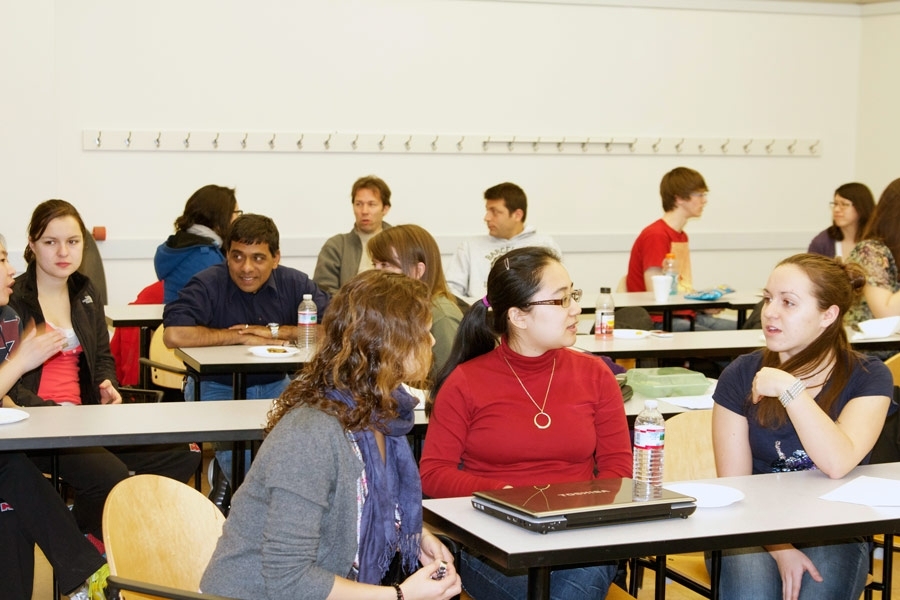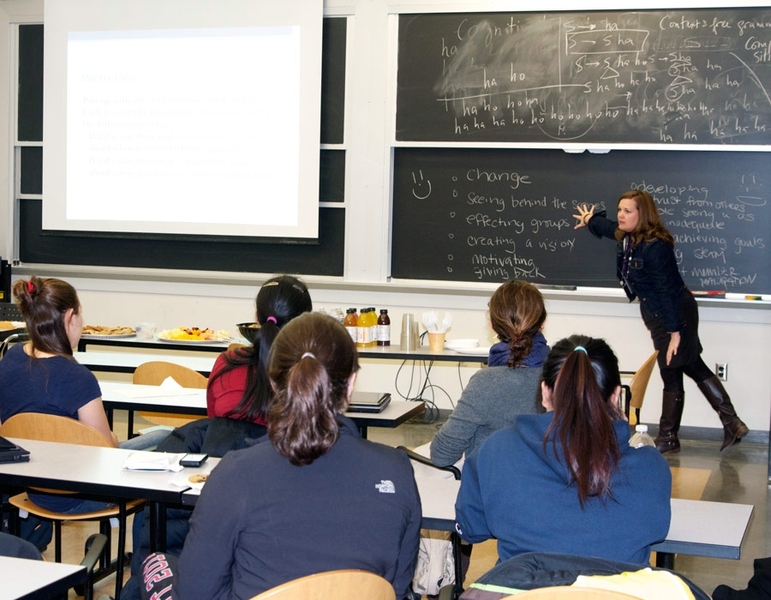During the Fall 2011 semester, the Student Activities Office, with help from the Fraternities, Sororities and Independent Living Groups (FSILG) Office, piloted a new leadership training program for MIT graduate and undergraduate students. The inaugural season of MIT L.E.A.D. (“Lead. Engage. Act. Develop.”) helped nearly 100 student leaders develop organizational leadership skills and discover new MIT resources in a series of one-hour workshops.
L.E.A.D. provides a new environment in which students can hone their leadership abilities. While some other leadership programs demand a significant and on-going time commitment, students are welcome to join the L.E.A.D. program for as many or as few of the one-hour sessions as they prefer.
“We’re working to make the L.E.A.D. series easily accessible to students. They just have to sign up and show up,” says Alicia Erwin, assistant director of the Student Activities Office. “We’re providing the building blocks that students need to be effective leaders.”
This semester, the L.E.A.D. program will shift from a concentration on organizational leadership to a focus on personal leadership. Last night’s “Preparing to lead student organizations” workshop marked the first in a series that will help students develop skills to build community. The series continues tonight with another workshop on connecting personal values with student organization involvement. Next week, workshops will focus on “The Emerging Leader.”
For more information and to register, view the L.E.A.D. program’s current workshops.
Over the course of last semester’s eight workshops, nearly 100 students attended at least one session, with some students signing up for as many as six. Student leaders in attendance represented general student organizations, department-based and dorm-based groups, and sports teams.
Graduate student Johanna Wolfson is president of the Science Policy Initiative at MIT and attended three L.E.A.D. workshops.
“As a graduate student, my main focus is on research and the lab. Running an organization requires a different set of skills entirely,” Wolfson says. “MIT students often go on to become leaders after they leave the Institute, so it’s great to be able to develop those skills now.”
Wolfson says the information she learned about transitioning between leadership teams was particularly helpful. “I think it’s easy for a group to lose momentum when leadership changes over because we’re all so busy doing different things,” she says. She also says that a workshop on conflict resolution — while not very applicable to her work with the Science Policy Initiative — could serve her well in the future.
Staff from across the Institute volunteered to facilitate individual workshops. Katie Maloney, director of the Parents Association and student/alumni relations for the MIT Alumni Association, worked with staff from the Public Service Center and Phil Walsh, director of the Campus Activities Complex, to facilitate a program to help students improve their fundraising efforts. The one-hour session, titled “Show Me the Money,” attracted student leaders from a diverse selection of student groups, including Engineers without Borders and the Volleyball Club.
“One of the most important reminders we had for students was that it’s important to ‘friend-raise’ before trying to fundraise,” Maloney says. “L.E.A.D. allows for students who are busy doing a lot of other things to develop their leadership skills. It’s one more offering on the buffet of leadership programs that MIT offers.”
Like the students who attended her session, Maloney says she benefited significantly from leading the program.
“For me, it was a great opportunity to work across departments. The other facilitators and I met two times before the session to talk about our goals. It helped me a lot, and it was great to talk through my own ideas,” Maloney says. “Now, I better understand their expertise, and I know when I can refer students to them for help.”
“It’s been great for the staff,” Erwin says. “About 25 staff members who never have the opportunity to work with each other came together to help develop this program.”
Along with organizing new personal leadership workshops this semester, the Student Activities Office has a number of plans to continue to expand the L.E.A.D. program in the long term. Student groups can already reach out to experts in a wide variety of topics through the growing L.E.A.D. “Speaker’s Bureau.” Student leaders will also be able to access a growing number of L.E.A.D. online resources, including video presentations and training sessions. The new resources will make leadership development more accessible for all MIT students, Erwin says.
“A lot of the skills and topics we discuss in the L.E.A.D. series are very transferrable to work environments, internships or other avenues students take once they graduate,” Erwin says. “There’s an assumption that MIT students are going to go forth and be leaders, but we have to ask how we’re helping them develop as leaders. The L.E.A.D. program addresses that.”
The Student Activities Office offers a number of other leadership programs. The Community Catalyst Leadership program matches MIT juniors with alumni in a coaching relationship program designed to meet the students’ personal development goals. The LeaderShape program, an intensive six-day development experience that takes place over IAP, is another opportunity for students to develop leadership skills.
For more information on MIT L.E.A.D. and to sign up for this semester’s workshops, visit the MIT L.E.A.D. website.
L.E.A.D. provides a new environment in which students can hone their leadership abilities. While some other leadership programs demand a significant and on-going time commitment, students are welcome to join the L.E.A.D. program for as many or as few of the one-hour sessions as they prefer.
“We’re working to make the L.E.A.D. series easily accessible to students. They just have to sign up and show up,” says Alicia Erwin, assistant director of the Student Activities Office. “We’re providing the building blocks that students need to be effective leaders.”
This semester, the L.E.A.D. program will shift from a concentration on organizational leadership to a focus on personal leadership. Last night’s “Preparing to lead student organizations” workshop marked the first in a series that will help students develop skills to build community. The series continues tonight with another workshop on connecting personal values with student organization involvement. Next week, workshops will focus on “The Emerging Leader.”
For more information and to register, view the L.E.A.D. program’s current workshops.
Over the course of last semester’s eight workshops, nearly 100 students attended at least one session, with some students signing up for as many as six. Student leaders in attendance represented general student organizations, department-based and dorm-based groups, and sports teams.
Graduate student Johanna Wolfson is president of the Science Policy Initiative at MIT and attended three L.E.A.D. workshops.
“As a graduate student, my main focus is on research and the lab. Running an organization requires a different set of skills entirely,” Wolfson says. “MIT students often go on to become leaders after they leave the Institute, so it’s great to be able to develop those skills now.”
Wolfson says the information she learned about transitioning between leadership teams was particularly helpful. “I think it’s easy for a group to lose momentum when leadership changes over because we’re all so busy doing different things,” she says. She also says that a workshop on conflict resolution — while not very applicable to her work with the Science Policy Initiative — could serve her well in the future.
Staff from across the Institute volunteered to facilitate individual workshops. Katie Maloney, director of the Parents Association and student/alumni relations for the MIT Alumni Association, worked with staff from the Public Service Center and Phil Walsh, director of the Campus Activities Complex, to facilitate a program to help students improve their fundraising efforts. The one-hour session, titled “Show Me the Money,” attracted student leaders from a diverse selection of student groups, including Engineers without Borders and the Volleyball Club.
“One of the most important reminders we had for students was that it’s important to ‘friend-raise’ before trying to fundraise,” Maloney says. “L.E.A.D. allows for students who are busy doing a lot of other things to develop their leadership skills. It’s one more offering on the buffet of leadership programs that MIT offers.”
Like the students who attended her session, Maloney says she benefited significantly from leading the program.
“For me, it was a great opportunity to work across departments. The other facilitators and I met two times before the session to talk about our goals. It helped me a lot, and it was great to talk through my own ideas,” Maloney says. “Now, I better understand their expertise, and I know when I can refer students to them for help.”
“It’s been great for the staff,” Erwin says. “About 25 staff members who never have the opportunity to work with each other came together to help develop this program.”
Along with organizing new personal leadership workshops this semester, the Student Activities Office has a number of plans to continue to expand the L.E.A.D. program in the long term. Student groups can already reach out to experts in a wide variety of topics through the growing L.E.A.D. “Speaker’s Bureau.” Student leaders will also be able to access a growing number of L.E.A.D. online resources, including video presentations and training sessions. The new resources will make leadership development more accessible for all MIT students, Erwin says.
“A lot of the skills and topics we discuss in the L.E.A.D. series are very transferrable to work environments, internships or other avenues students take once they graduate,” Erwin says. “There’s an assumption that MIT students are going to go forth and be leaders, but we have to ask how we’re helping them develop as leaders. The L.E.A.D. program addresses that.”
The Student Activities Office offers a number of other leadership programs. The Community Catalyst Leadership program matches MIT juniors with alumni in a coaching relationship program designed to meet the students’ personal development goals. The LeaderShape program, an intensive six-day development experience that takes place over IAP, is another opportunity for students to develop leadership skills.
For more information on MIT L.E.A.D. and to sign up for this semester’s workshops, visit the MIT L.E.A.D. website.







